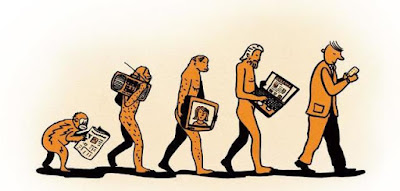Money talks. We all know that. Now, money may not make you a happier person
in the end, but it sure does help pay the bills.
So really, it shouldn’t come as a surprise to anyone that traditional media
is slowly dying a painful death. “Traditional
media” as we know it is being replaced by the sexier, much cooler, considerably
more cost-effective new guy, the Internet.
Traditionally, newspapers were
extremely partisan and geared toward their voters who subscribed to the papers,
because that was how they stayed in business. However, around the turn of the 20th
century, advertising was responsible for the majority of the incoming revenue
of most American news organizations, and they were able to change their style. “Reporters pledged themselves to ‘facts,
facts, and more facts,’” Lepore writes (2019).
Eventually, newspaper articles were no longer just factual, but the
writers began to incorporate their opinions and personal analysis to compete
with television (Lepore, 2019).
The television, on the other
hand, introduced Americans to a whole new way to view media. Television exposure can
make a difference in a politician’s campaign, it can present a major news event to the public, and even offers hours of entertainment for the entire family.
Anthony (2013) suggests, “Every
major happening is now captured by television, or it's not a major happening.” Events such as the fall of the Berlin Wall that
began on November 9, 1989, had not just Americans, but people all over the
world glued to their televisions for days, as the events unfolded before their
eyes on live TV (BBC News, 2019). And,
who can forget the morning of September 11, 2001? I remember I was sound asleep because I had a
late class that morning when a friend called to tell me what had just happened. He told me to turn on my TV to see what had
just happened. I asked him what channel
I needed to turn to and he told me to take my pick; it didn’t matter. I could have turned to CNN, CBS News, or the
Cartoon Network. They were all showing
the same frightful images of the planes crashing into the twin towers and the towers
tumbling to the ground. No one spoke a
word in class that day. Everyone was
speechless.
Of course, the TV,
my parents grew up watching is definitely not the same TV we watch today. Even the television programs I grew up watching
are not like what people watch today. My
son has no idea who Mr. Rogers is and has never had the pleasure of watching
Reading Rainbow on PBS. In fact, PBS (Public Broadcasting Service) charges $5 a month to watch certain shows for people who have cut the cord from cable and now stream their shows. PBS is no longer FREE! Growing up, we
had four main channels and our TV was enormous!
And there was no remote control. Unfortunately,
my siblings and I were the remote control.
And I was so jealous of my friends who were lucky enough to have cable
or satellite (the gigantic flying saucer looking satellite dish that takes up
half the backyard) because we still had what I referred to as “poor man's”
TV. I was a teenager before my parents
finally stepped into the 20th century and got cable. It was everything I thought it would be, and
more!
However, after
the turn of the century, as the Internet became more accessible and affordable,
television began to evolve as well. People no
longer had the time to sit through three minutes of commercials. Cable companies started offering customers
DVR service to record their programming, and broadcasting became digital. Social media sites like (MySpace – I know, My
What?), Facebook, Instagram, Snapchat, etc. revolutionized the way people communicate with each other. It did not
take long for people to become accustomed to the “come-and-go lifestyle” that
the Internet had afforded them. That being
said, large media conglomerates such as AT&T Inc., Facebook, and The Wall
Street Journal are still standing because they have the checkbooks to stay
afloat. These companies have bought
smaller media companies not able to survive since the recession and the change
of the media industry. The majority of people no longer desire a “paper” newspaper every day.
Considering that 96 percent of Americans own a cellphone of some form,
where 81 percent are smartphone owners, it is not a surprise to hear that
traditional print newspapers are dying.
People can access news at any time on their cell phones now. We have become a society of right now. It is no longer a question of if, it is when. The real question is, how much longer do they
have?
As sad as it may be, the reality is there is a life-cycle for most of us. I include products and practices in this cycle as well. Communication isn't any different. Newspapers are cycling through. Radio, television, the Internet, even fashion all have a life-cycle. Either we embrace the changes or we are going to get left in the dust, because whether we like it or not, money talks.
Joe Moran, professor of English and cultural history at Liverpool John Moores University, quotes a
dumbfounded Joey Tribbiani (Matt LeBlanc) from Friends on learning that a new acquaintance doesn't have a TV
set: "But what does your furniture point at?"
References
BBC News. (2019,
November 5). How 1989 reshaped the modern world. Retrieved from
https://www.bbc.com/news/world-europe-50013048
Pew Research
Center. (2019, June 12). Mobile Fact Sheet. Retrieved from https://www.pewresearch.org/internet/fact-sheet/mobile/




Comments
Post a Comment